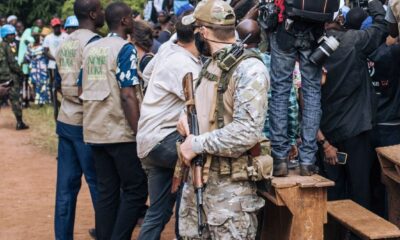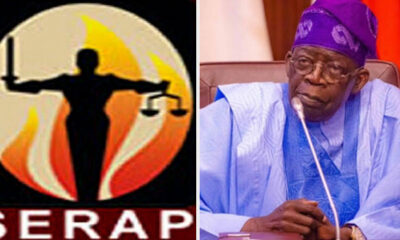Strictly Personal
I stand with Buhari by Lasisi Olagunju
Published
2 years agoon

The story you are about to read was published by the Nigerian Tribune 38 years ago. It was the lead story of its June 5, 1984 edition. Written by Joe Aladesohun, it was headlined: ‘Man commits suicide’ with a rider: ‘frustration at the bank’.
The report:
A middle-aged man committed suicide in Ibadan last Wednesday following what sources described as “series of hopeless visits to his bank for cash.”
The partly decomposed body of Mr. K. O. (I withhold the name), a 48-year-old civil servant of the accounts department of the Oyo State Ministry of Information, Youths, Sports and Culture, was found dangling under the ceiling fan in one of his rooms three days after his death.
A suicide note left on a stool in the room showed that he decided to end his life out of frustration.
The deceased was said to have collapsed twice in the premises of a bank and was rushed home on each occasion without cash.
Last Monday, May 28, two days before he committed suicide, somebody had given him N2 (two naira) after narrating his ordeal.
An ulcer patient, the deceased was said to have complained about taking only pap, his regular meal, since he couldn’t withdraw cash from his bank.
His remains were laid to rest on Monday at the public cemetery, Sango, Ibadan.
Contacted on telephone on Monday, the state Police Commissioner, Mr. Archibong Nkana, simply said: “I think there was something like that.”
The suicide note left behind by the deceased reads: “Do not forget that I have insisted that the receipt of the purchased stationery is in the steel cabinet. I’m sorry I have to end up this way but I think that is the only way open to me.
“Find the cheque and the cheque book in the cupboard. I have done all I can to maintain a fairly good standard.
“The keys to the cupboard are in my drawer. The payment vouchers are in the steel cabinet.
“My burial should be simple, no mourning, no wailing, no reason for that.
“Bye, comrades, I have beaten the gun.” (End of story).
I work in a place with a library that houses almost all editions of all newspapers that have ever been published in Nigeria. J.K. Rowling, author of the Harry Potter fantasy series, said “when in doubt, go to the library.” I consult the library for the same reason the diviner goes to his crystal ball. “Journalism is history on the run…history written in time to be acted upon,” said Thomas Griffith in the January 1959 issue of Nieman Reports. There is always an answer in history – and in journalism – and in the library. Insights into questions on everything are there, always, if you bore deep enough. I did that after listening to President Muhammadu Buhari’s lamentation in Owerri, Imo State, last week about his not being appreciated for the great work he has done (and is doing) with our lives. “This administration has done extremely well. I have to say it because those who are supposed to say it are not saying it. I don’t know why,” he said. I listened to him and felt he was in too much of a hurry. He was here from December 1983 to August 1985. During his first coming, he did so much with Nigerians, one of which was the currency exchange exercise of April/May 1984 which killed the man in the above story.
Buhari as military head of state did so many things that made children of those days grow old suddenly. It wasn’t enough that you had money in your bank accounts. Access to what you had was at the whim of the potentate in Dodan Barracks, Lagos, the then seat of government. People queued for days to get cash from their banks and went home empty-handed. Some got thoroughly whipped by soldiers on a corrective mission. Today’s young people can’t believe such was possible. But they happened. He made a law that made it a crime for journalists to publish the truth if it embarrassed people in government. He used that law to jail two Guardian journalists for publishing the truth. There was a scarcity of everything, including fundamental freedoms and staple foods. Nigerians cried for justice and rights and queued for sugar and rice. Buhari did many more to groups and individuals from the sea to the desert. Then, he was sacked by his comrades on August 27, 1985. Ibrahim Babangida, the man who replaced him, summed his regime up in the following words: “The last 20 months have not witnessed any significant changes in the national economy. Contrary to expectations, we have so far been subjected to a steady deterioration in the general standard of living; and intolerable suffering by ordinary Nigerians has risen higher; scarcity of commodities has increased…. Unemployment has stretched to critical dimensions.” Buhari was removed and replaced and there were wild jubilations. He must have felt terribly let down by that attitude of ingratitude – exactly as he feels now.
In 1985, Buhari believed he did very well; in 2022, he is convinced of his excellent pass mark in his current tour of duty. He has built roads and rail lines; he is building roads and rail lines. But he has also amassed debts enough to chew for ten centuries. And this is precisely where I am going. For his ‘excellent’ service as military ruler, the appreciation did not come for General Buhari in 1985 but it came thirty years later. Everyone who was his victim during his first life went looking for him to come back in 2015. Even Babangida supported him. Not many humans are that blessed. He is blessed. All his victims formed an armada of excuses to bring him back to power. They scented the septic in his tank and served it to the street as àmàlà and gbègìrì. He became a hurricane, the type that tore through woods and rocks. At least one of the jailed journalists, Tunde Thompson, openly campaigned for his election in 2015. “I have seen that time is a healer of certain wounds because people are still asking: ‘the man who jailed you wants to become president, what do you feel about it?’ They asked if I would vote for such a man. I want to say categorically that Buhari as the head of state at the time didn’t order the detention of Mr. Tunde Thompson and Nduka Irabor. He never did. Even Idiagbon did not. It was the head of NSO that ordered our arrest. That was the file my colleague saw when he was brought in to see Rafindadi after I had briefed him. And that was an order that they complied with. Buhari was not responsible for our arrest, so I do not see why at this time people are trying to make political capital out of what happened in 1984. Apart from that, it was an issue in the 2011 election. Between 2010 and 2011 people kept saying this over and over again. I think it’s now over 30 years, people should learn to be charitable; they should learn to forgive and let bygones be bygones, especially when we know the truth about who did what. I would like to say that Buhari didn’t order my arrest, so I bear no grudge against him,” the journalist said and added that he would vote for Buhari because he believed “that a person like Buhari at this time can call anybody to order and some people are afraid of that.”
I am sure that the man who killed himself in the above story, if he reincarnated and was around in 2015 as an àkúdàáyà, he would probably be one of the 15 million Nigerians who brought Buhari back. If it was a spell, it worked very well. It can still work again.
So, the president should not be angry in 2022 that we are hostile to the pangs and pains of his loving-kindness towards us. We will praise him tomorrow. He should ignore those who are supposed to sing the song of his excellence in power but are not saying it. The naira may exchange at a million for a US dollar; ASUU may be on strike for a year and universities closed forever; bandits and terrorists may continue to stop and shoot at moving trains; kidnappers may kidnap kings, governments and governors; the road to the farm may be shut to farmers; the path to the brook may be closed to fetchers of water; life may be generally brutish, nasty and short. Buhari should just calm down, eat and pick his teeth. All those won’t matter in the long run –which is not far away. We have a history of doing what abusive snail does to Òrìsà; it always goes back, shell and radula, with a rasping apology. If the world does not come to an end soon, every one of us abusing this president today may still beg him to stay here forever – or come back after his final round.
Do not just read the president; watch him. It is only by watching Buhari that you can read enough of his inscrutably opaque mind. Look for his Imo State video and watch how he looks as he says this: “This administration has done extremely well. I have to say it because those who are supposed to say it are not saying it. I don’t know why.” Who do you think he is referring to as the “they” who are “not saying it”? Lai Mohammed? No. Femi Adesina? No. Garba Shehu? No. Buhari does not have the character of a leader who throws his loyal lieutenants under the bus. Not at all. Those “who are supposed to say it but are not saying it” are the president’s party men; those who scheme to use his fingers to pull their chestnuts out of the fire of electoral politics without being seen with him. They are the ACN/ANPP people in the APC; the èmi l’ó kàn people. Bola Tinubu is ACN; his running mate, Kashim Shettima, is ANPP. Shettima campaigns with his Borno achievements; Tinubu flaunts his Lagos claims as proof of his leadership ingenuity. Neither is touching Buhari and his government with a long pole.
Was that how they started in 2015? No. Not even in 2019 did the current champions erect a Berlin Wall between their ‘ingenuity’ and Buhari’s ‘integrity.’ So, I stand with Buhari. Let the ACN/ANPP people stop running away from promoting his legacies. Ibadan people say those who dined with Salami Agbaje must compulsorily address him as Bàbá l’Áyéyé. “Truth always prevails in the end,” wrote Lord Acton, “but only when it has ceased to be in someone’s interest to prevent it from doing so.” What we have in the ruling party is a divorce without physical separation. It is like the candidates of the APC (top to bottom) want the party without its problem. The government is that problem; it is a floundering ship which no one outside the cockpit is willing to save. They campaign as an opposition with adversarial promises that should anger Buhari and his loyalists.
How is this likely to end? I have tried searching literature and history. I have read the story of Ali Baba and the Forty Thieves. The rogues lost everything, Ali Baba survived. I have read Treasure Finders – another tale of a band of thieves who abducted a man of charms and got him to rain for them the Seven Things of Price: gold, silver, pearl, coral, catseye, ruby, and diamond. The thieves here got their price but also lost it; they murdered one another; none survived, not even the innocent abducted man who rained for them the treasure. Those who fished out Buhari and made him their candidate in 2015 did not do it because they loved him or wished Nigeria well. He was retired and tired of losing repeatedly. But because they saw in him a shortcut to their life ambition to rule Nigeria, they went to Kaduna and told him: “come and contest again, we will back you and you will win.” They saw in his hand the magic wand to command 12 million northern votes. He surrendered to them and contested and won and the skies came down and collided with the earth. From top to bottom, the world went bad. Those who brought him now seek to be quiet on everything about his regime. Good or bad, they cannot now run away from drinking from the well of Buhari’s years. They should market themselves in Buhari’s tray. They swam with him in 2015 and 2019; they must swim and/or sink with him in 2023.
You may like
-


African Union must ensure Sudan civilians are protected, By Joyce Banda
-


Economic policies must be local, By Lekan Sote
-


Dangote Refinery: A timely win for industrialisation, By Abiodun Alade
-


Mpox crisis: We need an equity-driven pandemic treaty, By Magda Robalo
-


Olympics had free lessons for African leaders, By Tee Nugugi
-


Athletes bring gold, economists bring debts, botched projects, By Joachim Buwembo
Strictly Personal
Budgets, budgeting and budget financing, By Sheriffdeen A. Tella, Ph.D.
Published
4 days agoon
November 20, 2024
The budget season is here again. It is an institutional and desirable annual ritual. Revenue collection and spending at the federal, State and local government levels must be authorised and guided by law. That is what budget is all about. A document containing the estimates of projected revenues from identified sources and the proposed expenditure for different sectors in the appropriate level of government. The last two weeks have seen the delivery of budget drafts to various Houses of Assembly and the promise that the federal government would present its draft budget to the National Assembly.
Do people still look forward to the budget presentation and the contents therein? I am not sure. Citizens have realised that these days, governments often spend money without reference to the approved budget. A governor can just wake up and direct that a police station be built in a location. With no allocation in the budget, the station will be completed in three months. The President can direct from his bathroom that 72 trailers of maize be distributed to the 36 states as palliatives. No budget provision, and no discussion by relevant committee or group.
We still operate with the military mentality. We operated too long under the military and of the five Presidents we have in this democracy, two of them were retired military Heads of State. Between them, they spent 16 years of 25 years of democratic governance. Hopefully, we are done with them physically but not mentally. Most present governors grew up largely under military regimes with the command system. That is why some see themselves as emperor and act accordingly. Their direct staff and commissioners are “Yes” men and women. There is need for disorientation.
The importance of budget in the art of governance cannot be overemphasized. It is one of the major functions of the legislature because without the consideration and authorisation of spending of funds by this arm of government, the executive has no power to start spending money. There is what we refer to as a budget cycle or stages. The budget drafting stage within the purview of the executive arm is the first stage and, followed by the authorisation stage where the legislature discusses, evaluates and tinkers with the draft for approval before presenting it to the President for his signature.
Thereafter, the budget enters the execution phase or cycle where programmes and projects are executed by the executive arm with the legislature carrying out oversight functions. Finally, we enter the auditing phase when the federal and State Auditors verify and report on the execution of the budgets. The report would normally be submitted to the Legislature. Many Auditor Generals have fallen victim at this stage for daring to query the executives on some aspects of the execution in their reports.
A new budget should contain the objectives and achievements of the preceding budget in the introduction as the foundation for the budget. More appropriately, a current budget derives its strength from a medium-term framework which also derives its strength from a national Development Plan or a State Plan. An approved National Plan does not exist currently, although the Plan launched by the Muhammadu Buhari administration is in the cooler. President Tinubu, who is acclaimed to be the architect of the Lagos State long-term Plan seems curiously, disillusioned with a national Plan.
Some States like Oyo and Kaduna, have long-term Plans that serve as the source of their annual budgets. Economists and policymakers see development plans as instruments of salvation for developing countries. Mike Obadan, the former Director General of the moribund Nigeria Centre for Economic and Management Administration, opined that a Plan in a developing country serves as an instrument to eradicate poverty, achieve high rates of economic growth and promote economic and social development.
The Nigerian development plans were on course until the adoption of the World Bank/IMF-inspired Structural Adjustment Programme in 1986 when the country and others that adopted the programme were forced to abandon such plan for short-term stabilisation policies in the name of a rolling plan. We have been rolling in the mud since that time. One is not surprised that the Tinubu administration is not looking at the Buhari Development Plan since the government is World Bank/IMF compliant. It was in the news last week that our President is an American asset and by extension, Nigeria’s policies must be defined by America which controls the Bretton Woods institutions.
A national Plan allows the citizens to monitor quantitatively, the projects and programmes being executed or to be executed by the government through the budgeting procedure. It is part of the definitive measures of transparency and accountability which most Nigerian governments do not cherish. So, you cannot pin your government down to anything.
Budgets these days hardly contain budget performance in terms of revenue, expenditure and other achievements like several schools, hospitals, small-scale enterprises, etc, that the government got involved in successfully and partially. These are the foundation for a new budget like items brought forward in accounting documents. The new budget should state the new reforms or transformations that would be taking place. Reforms like shifting from dominance of recurrent expenditure to capital expenditure; moving from the provision of basic needs programmes to industrialisation, and from reliance on foreign loans to dependence on domestic fund mobilisation for executing the budget.
That brings us to the issue of budget deficit and borrowing. When an economy is in recession, expansionary fiscal policy is recommended. That is, the government will need to spend more than it receives to pump prime the economy. If this is taken, Nigeria has always had a deficit budget, implying that we are always in economic recession. The fact is that even when we had a surplus in our balance of payment that made it possible to pay off our debts, we still had a deficit budget. We are so used to borrowing at the national level that stopping it will look like the collapse of the Nigerian state. The States have also followed the trend. Ordinarily, since States are largely dependent on the federal government for funds, they should promote balanced budget.
The States are like a schoolboy who depends on his parents for school fees and feeding allowance but goes about borrowing from classmates. Definitely, it is the parents that will surely pay the debt. The debt forgiveness mentality plays a major role in the process. Having enjoyed debt forgiveness in the past, the federal government is always in the credit market and does not caution the State governments in participating in the market. Our Presidents don’t feel ashamed when they are begging for debt forgiveness in international forum where issues on global development are being discussed. Not less than twice I have watched the countenance of some Presidents, even from Africa, while they looked at our president with disdain when issues of debt forgiveness for African countries was raised.
In most cases, the government, both at the federal and state cannot show the product of loans, except those lent by institutions like the World Bank or African Development Bank for specific projects which are monitored by the lending institutions. In other cases, the loans are stolen and transferred abroad while we are paying the loans. In some other cases, the loans are diverted to projects other than what the proposal stated. There was a case of loans obtained based on establishing an international car park in the border of the State but diverted to finance the election of a politician in the State. The politician eventually lost the election but the citizens of the State have to be taxed to pay the loan. Somebody as “Nigeria we hail thee”.
Transformation in budgeting should commence subsequently at the State and federal level. Now that local government will enjoy some financial autonomy and therefore budgeting process, they should be legally barred from contracting foreign loans. They have no business participating in the market. They should promote balanced budget where proposed expenditures must equal the expected revenues from federal and internal sources. The State government that cannot mobilise, from records, up to 40 percent of its total budget from IGR should not be supported to contract foreign loans. The States should engage in a balanced budget. The federal government budget should shift away from huge allocations to recurrent expenditure towards capital expenditure for capital formation and within the context of a welfarist state.
Sheriffdeen A. Tella, Ph.D.
Strictly Personal
African Union must ensure Sudan civilians are protected, By Joyce Banda
Published
1 month agoon
October 25, 2024
The war in Sudan presents the world – and Africa – with a test. This far, we have scored miserably. The international community has failed the people of Sudan. Collectively, we have chosen to systematically ignore and sacrifice the Sudanese people’s suffering in preference of our interests.
For 18 months, the Rapid Support Forces (RSF) and the Sudanese Armed Forces (SAF) have fought a pitiless conflict that has killed thousands, displaced millions, and triggered the world’s largest hunger crisis.
Crimes against humanity and war crimes have been committed by both parties to the conflict. Sexual and gender-based violence are at epidemic levels. The RSF has perpetrated a wave of ethnically motivated violence in Darfur. Starvation has been used as a weapon of war: The SAF has carried out airstrikes that deliberately target civilians and civilian infrastructure.
The plight of children is of deep concern to me. They have been killed, maimed, and forced to serve as soldiers. More than 14 million have been displaced, the world’s largest displacement of children. Millions more haven’t gone to school since the fighting broke out. Girls are at the highest risk of child marriage and gender-based violence. We are looking at a child protection crisis of frightful proportions.
In many of my international engagements, the women of Sudan have raised their concerns about the world’s non-commitment to bring about peace in Sudan.
I write with a simple message. We cannot delay any longer. The suffering cannot be allowed to continue or to become a secondary concern to the frustrating search for a political solution between the belligerents. The international community must come together and adopt urgent measures to protect Sudanese civilians.
Last month, the UN’s Independent International Fact-Finding Mission for Sudan released a report that described a horrific range of crimes committed by the RSF and SAF. The report makes for chilling reading. The UN investigators concluded that the gravity of its findings required a concerted plan to safeguard the lives of Sudanese people in the line of fire.
“Given the failure of the warring parties to spare civilians, an independent and impartial force with a mandate to safeguard civilians must be deployed without delay,” said Mohamed Chande Othman, chair of the Fact-Finding Mission and former Chief Justice of Tanzania.
We must respond to this call with urgency.
A special responsibility resides with the African Union, in particular the AU Commission, which received a request on June 21 from the AU Peace and Security Council (PSC) “to investigate and make recommendations to the PSC on practical measures to be undertaken for the protection of civilians.”
So far, we have heard nothing.
The time is now for the AU to act boldly and swiftly, even in the absence of a ceasefire, to advance robust civilian protection measures.
A physical protective presence, even one with a limited mandate, must be proposed, in line with the recommendation of the UN Fact-Finding Mission. The AU should press the parties to the conflict, particularly the Sudanese government, to invite the protective mission to enter Sudan to do its work free from interference.
The AU can recommend that the protection mission adopt targeted strategies operations, demarcated safe zones, and humanitarian corridors – to protect civilians and ensure safe, unhindered, and adequate access to humanitarian aid.
The protection mission mandate can include data gathering, monitoring, and early warning systems. It can play a role in ending the telecom blackout that has been a troubling feature of the war. The mission can support community-led efforts for self-protection, working closely with Sudan’s inspiring mutual-aid network of Emergency Response Rooms. It can engage and support localised peace efforts, contributing to community-level ceasefire and peacebuilding work.
I do not pretend that establishing a protection mission in Sudan will be easy. But the scale of Sudan’s crisis, the intransigence of the warring parties, and the clear and consistent demands from Sudanese civilians and civil society demand that we take action.
Many will be dismissive. It is true that numerous bureaucratic, institutional, and political obstacles stand in our way. But we must not be deterred.
Will we stand by as Sudan suffers mass atrocities, disease, famine, rape, mass displacement, and societal disintegration? Will we watch as the crisis in Africa’s third largest country spills outside of its borders and sets back the entire region?
Africa and the world have been given a test. I pray that we pass it.
Dr Joyce Banda is a former president of the Republic of Malawi.
EDITOR’S PICK


EU withdraws Niger diplomat after junta accuses it of mismanaging aid
The European External Action Service (EEAS) has announced that the European Union would return its ambassador from Niger after the...


Mali: 7 Russian mercenaries killed
An al Qaeda offshoot in North Africa has claimed responsibility for the attack in central Mali, killing at least seven...


Mpox remains health emergency, WHO insists
The World Health Organisation (WHO) has insisted that the Mpox epidemic remains a public health emergency. WHO first declared an...


Italy concerned over adult actor detained in Egypt
Officials in Italy, where sentiments are still high over the unresolved murder of student Giulio Regeni, who was detained and...


Fintech startup DigMo launched in Zambia to gamify financial planning
DigMo, a gamified fintech startup which helps users to build wealth tools from low to middle-income earners, has been launched...


TP Mazembe pip AS FAR to win African Women’s Champions League
TP Mazembe of the Democratic Republic of Congo (DRC) became the third team to win the 2024 African Women’s Champions...


Nicki Minaj eulogizes Davido for collaborating with her on new song
American rapper, Onika Maraj, popularly known as Nicki Minaj, has poured encomium on Nigerian Afrobeats superstar, David Adeleke, aka Davido,...


Zambia: Farmers’ union warns of uncertain future for agriculture sector
The Small-Scale Farmers Development Agency (SAFADA) of Zambia has warned of uncertainty on the future of the agricultural sector, stating...


Nigeria: CSO urges President Tinubu to investigate missing funds in Humanitarian Ministry
A Nigerian civil society organization, the Socio-Economic Rights and Accountability Project (SERAP), has called on President Bola Tinubu to launch...


South African DJ Black Coffee bags World’s Best DJ 2024
South African disc jockey, DJ Black Coffee, has been named the World’s Best DJ 2024 at the Golden Moon Awards....
Trending
-

 Politics2 days ago
Politics2 days agoMauritius’ Prime Minister to double as Finance Minister
-

 Metro2 days ago
Metro2 days agoFinland-based Nigerians in panic as authorities search for Simon Ekpa’s sponsors
-

 Metro10 hours ago
Metro10 hours agoNigeria: CSO urges President Tinubu to investigate missing funds in Humanitarian Ministry
-

 Metro1 day ago
Metro1 day agoZambian govt successfully repatriates trafficked toddler from Mozambique


